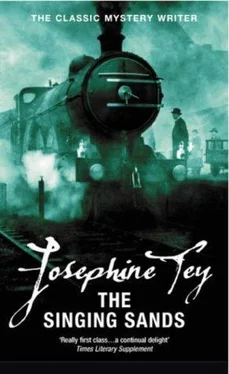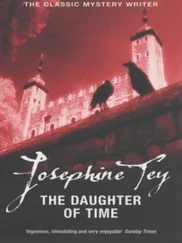‘Bill wouldn’t keep a diary!’
‘Not that kind. The Meet-Jack-1.15-Call-For-Toots-7.30 kind.’
‘Oh, yes, that. Yes, I expect he’d have one of those if he was going touting round London for backing. Brother, that may be all we need!’
‘That will be all we need. If it is there.’
But nothing was there.
Nothing at all.
They began light-heartedly with the obvious places: Euston, the airport, Victoria; pleased with the formula that worked so well.
‘Hullo, Inspector. What can I do for you today?’
‘Well, you might be able to help my young friend from America.’
‘Yes? One for the three-thirty?’
‘We’ve got one for the three-thirty. He wants to know whether his buddy left a couple of suitcases here. Do you mind if he has a look round? We don’t want to move anything. Just to look.’
‘Well, that’s something that’s still free in this country, Inspector, believe it or not. Come behind, will you?’
So they came behind. Each time they came behind. And each time the tiered luggage looked back at them, contemptuous and withdrawn. As detached as only other people’s belongings can look.
From the likely places they moved on to the mere possibles, sobered and apprehensive. They had hoped for a diary, for personal papers. Now they would settle for even a sight of those suitcases.
But there were no familiar cases on any of the shelves.
This so staggered Tad that Grant had difficulty in dragging him away from the later ports-of-call. He went round and round the filled racks in an unbelieving daze.
‘They must be here,’ he kept saying. ‘They must be here.’
But they were not there.
As they came out on to the street, baffled, after their last bet had gone down the drain, he said: ‘Inspector, I mean Mr Grant, where else is there that you would leave luggage after checking out of a hotel? Have you those personal lock-up places?’
‘Only limited-period ones. For people who want to park a case for an hour or two while they do something.’
‘Well, where are Bill’s things, why aren’t they in any of the obvious places?’
‘I don’t know. They may be with his girl.’
‘What girl?’
‘I don’t know. He was young, and handsome, and celibate; he would have a fairly wide choice.’
‘Yes, of course. That’s maybe what he did with them. Which reminds me.’ His face lost its discontented, purposeless look. He glanced at his watch. It was nearly dinner-time. ‘I’ve got a date with that girl in the milk-bar.’ He caught Grant’s eye and looked faintly abashed. ‘But I’ll stand her up if you think I can be any good to you.’
Grant sent him away to meet his milk-bar sweetie with a slight sense of relief. It was rather like having a mournful puppy around. He himself decided to postpone dinner for a little and go and see some of his Metropolitan friends.
He dropped into the Astwick Street Police Station and was greeted with the identical phrase that he had been listening to all the afternoon and evening: ‘Hullo, Inspector, what can we do for you?’
Grant said that they might tell him who was on the Britt Lane beat just now.
The man on the beat was P.C. Bithel, it seemed; and if the Inspector wanted to see him he was at this moment in the canteen having sausage-and-mash. His number was 30.
Grant found Number Thirty at a table by himself at the far end of the room. A French grammar was propped up in front of him. Looking at him, sitting there unaware, Grant thought how London policemen had changed in type in the short space of a quarter-century. He himself, he knew, was a departure from type; a fact that had been of great use to him on various occasions. P.C. Bithel was a dark, slight boy from County Down with a matt sallow skin and a kind reassuring drawl. Between the French grammar and the drawl, Grant felt that P.C. Bithel was headed for great things.
The boy began to get up when Grant had introduced himself, but Grant sat down and said: ‘There’s one small thing you might do for me. I’d like to know who cleans the windows of 5 Britt Lane. You might make a few inquiries when—’
‘Mr Lloyd’s place?’ the boy said. ‘Richards does them.’
Yes, indeed, and indeed P.C. Bithel had a future; he must keep his eye on P.C. Bithel.
‘How do you know that?’
‘I pass the time of day with him here and there on my beat. He stables his barrow and things in that mews further along Britt Lane.’
He thanked the budding Superintendent and went away to find Richards. Richards, it seemed, lived above his barrow. He was a bachelor ex-serviceman with a short leg, a cat, a collection of china mugs, and a passion for darts. There was nothing that P.C. Bithel, not long from County Down, did not know about his London beat.
At the corner of Britt Lane was the Sun, where Richards played darts, and it was to the Sun that Grant went. This was to be an altogether informal arrangement and it demanded an informal launching. He did not know the Sun or its proprietor, but he had only to sit still and behave himself and presently he would be invited to play darts, and from that to having a quiet one with Richards was only a step.
It was a step that took a couple of hours, as it turned out; but eventually he had Richards to himself in a corner with a pint. He was debating with himself whether to produce his card and use his official credentials for unofficial business, or to make it an affair of one ex-serviceman obliging another for a small consideration, when Richards said:
‘You don’t seem to have put on any weight with the years, sir.’
‘Have I met you somewhere?’ Grant asked, a little annoyed that he should have forgotten a face.
‘Camberley. More years ago than I like to think about. And you needn’t worry about forgetting me,’ he added, ‘because I doubt if you ever saw me. I was a cook. You still in the Army?’
‘No, I’m a policeman.’
‘No kidding! Well, well. I’d have said you were a dead cert for C.I.G.S. I see now why you were so anxious to get me into a corner. And me thinking it was my way with a dart that won you!’
Grant laughed. ‘Yes, you can do something for me, but it isn’t official business. Would you take a pupil tomorrow for a small consideration?’
‘To do any special windows?’ Richards asked, after a moment’s thought.
‘Number 5 Britt Lane.’
‘Ho!’ said Richards, amused. ‘ I’d pay him to do them ?’
‘Why?’
‘That bastard is never pleased. There’s no hanky-panky about this, is there?’
‘Neither hanky, nor panky. Nothing is going to be abstracted from the house, and nothing upset. I’ll go bail for that. Indeed, if it will make you any happier, I’ll put the contract in writing.’
‘I’ll take your word for it, sir. And your man can have the privilege of doing Mr Flipping Lloyd’s windows for nothing.’ He lifted his mug. ‘Here’s to the old eyes-right. What time will your pupil be coming along tomorrow?’
‘Ten o’clock do?’
‘Make it half-past. Your valentine goes out most mornings about eleven.’
‘That’s very thoughtful of you.’
‘I’ll get my early windows done and meet him at my place—3 Britt Mews—at half-past ten.’
It was no use trying to telephone Tad Cullen again tonight, so Grant left a message at the Westmorland asking him to come to the flat as soon as he had had breakfast in the morning.
Then he at last had dinner, and went thankfully to bed.
As he was falling asleep a voice in his head said: ‘Because he knew that there was nothing to write on.’
‘What?’ he said, coming awake. ‘Who knew?’
‘Lloyd. He said: “On what?”’
Читать дальше












